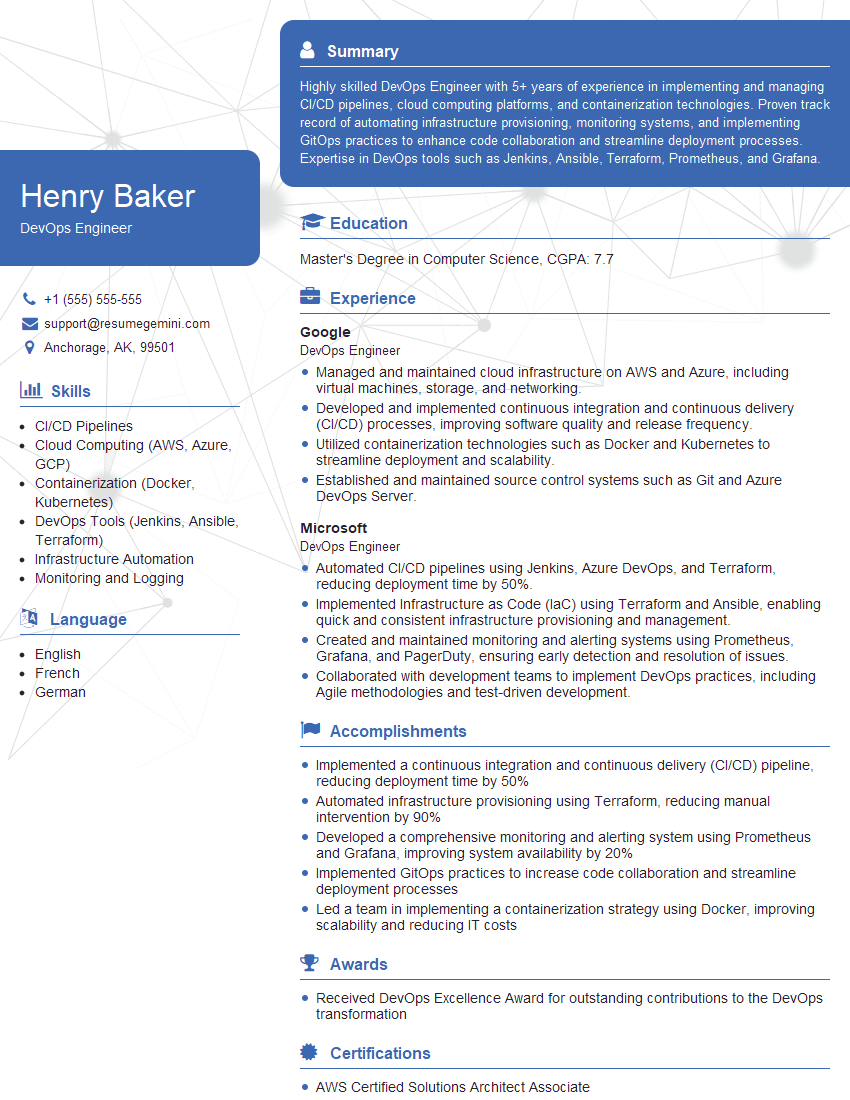Are you a seasoned DevOps Engineer seeking a new career path? Discover our professionally built DevOps Engineer Resume Template. This time-saving tool provides a solid foundation for your job search. Simply click “Edit Resume” to customize it with your unique experiences and achievements. Customize fonts and colors to match your personal style and increase your chances of landing your dream job. Explore more Resume Templates for additional options.

Henry Baker
DevOps Engineer
Summary
Highly skilled DevOps Engineer with 5+ years of experience in implementing and managing CI/CD pipelines, cloud computing platforms, and containerization technologies. Proven track record of automating infrastructure provisioning, monitoring systems, and implementing GitOps practices to enhance code collaboration and streamline deployment processes. Expertise in DevOps tools such as Jenkins, Ansible, Terraform, Prometheus, and Grafana.
Education
Master’s Degree in Computer Science
October 2016
Skills
- CI/CD Pipelines
- Cloud Computing (AWS, Azure, GCP)
- Containerization (Docker, Kubernetes)
- DevOps Tools (Jenkins, Ansible, Terraform)
- Infrastructure Automation
- Monitoring and Logging
Work Experience
DevOps Engineer
- Managed and maintained cloud infrastructure on AWS and Azure, including virtual machines, storage, and networking.
- Developed and implemented continuous integration and continuous delivery (CI/CD) processes, improving software quality and release frequency.
- Utilized containerization technologies such as Docker and Kubernetes to streamline deployment and scalability.
- Established and maintained source control systems such as Git and Azure DevOps Server.
DevOps Engineer
- Automated CI/CD pipelines using Jenkins, Azure DevOps, and Terraform, reducing deployment time by 50%.
- Implemented Infrastructure as Code (IaC) using Terraform and Ansible, enabling quick and consistent infrastructure provisioning and management.
- Created and maintained monitoring and alerting systems using Prometheus, Grafana, and PagerDuty, ensuring early detection and resolution of issues.
- Collaborated with development teams to implement DevOps practices, including Agile methodologies and test-driven development.
Accomplishments
- Implemented a continuous integration and continuous delivery (CI/CD) pipeline, reducing deployment time by 50%
- Automated infrastructure provisioning using Terraform, reducing manual intervention by 90%
- Developed a comprehensive monitoring and alerting system using Prometheus and Grafana, improving system availability by 20%
- Implemented GitOps practices to increase code collaboration and streamline deployment processes
- Led a team in implementing a containerization strategy using Docker, improving scalability and reducing IT costs
Awards
- Received DevOps Excellence Award for outstanding contributions to the DevOps transformation
Certificates
- AWS Certified Solutions Architect Associate
- Azure Fundamentals
- Certified Information Systems Security Professional (CISSP)
- Certified Kubernetes Administrator (CKA)
Career Expert Tips:
- Select the ideal resume template to showcase your professional experience effectively.
- Master the art of resume writing to highlight your unique qualifications and achievements.
- Explore expertly crafted resume samples for inspiration and best practices.
- Build your best resume for free this new year with ResumeGemini. Enjoy exclusive discounts on ATS optimized resume templates.
How To Write Resume For DevOps Engineer
- Quantify your accomplishments with specific metrics and results to demonstrate the impact of your work.
- Highlight your proficiency in specific DevOps tools and technologies, showcasing your expertise in the field.
- Provide concrete examples of how your DevOps initiatives have improved efficiency, reduced costs, or enhanced software quality.
- Demonstrate your understanding of DevOps principles and best practices, showcasing your commitment to continuous improvement.
Essential Experience Highlights for a Strong DevOps Engineer Resume
- Design and implement CI/CD pipelines to automate the software development lifecycle, reducing deployment time and improving software quality.
- Utilize cloud computing platforms (AWS, Azure, GCP) to provision and manage infrastructure, ensuring scalability, reliability, and cost-effectiveness.
- Employ containerization technologies (Docker, Kubernetes) to package, deploy, and manage applications, improving scalability and reducing IT costs.
- Implement comprehensive monitoring and alerting systems (Prometheus, Grafana) to monitor system performance, identify bottlenecks, and ensure high availability.
- Drive adoption of GitOps practices to enhance code collaboration, streamline deployment processes, and improve code quality.
- Collaborate with development and operations teams to bridge the gap between software development and infrastructure management.
- Stay abreast of the latest DevOps trends and technologies, continuously improving processes and tools to enhance efficiency and effectiveness.
Frequently Asked Questions (FAQ’s) For DevOps Engineer
What is the role of a DevOps Engineer?
A DevOps Engineer is responsible for bridging the gap between development and operations teams, ensuring seamless software delivery and maintenance. They automate and streamline processes, implement monitoring and logging systems, and drive continuous improvement initiatives.
What are the key skills required for a DevOps Engineer?
DevOps Engineers require a strong foundation in software development, cloud computing, containerization, and DevOps tools. They must possess excellent communication and collaboration skills, as well as a deep understanding of Agile methodologies and DevOps principles.
What are the career prospects for DevOps Engineers?
DevOps Engineers are in high demand due to the increasing adoption of DevOps practices in organizations. They can advance to roles such as DevOps Manager, Cloud Architect, or Site Reliability Engineer, with opportunities for leadership and specialization.
How can I prepare for a career as a DevOps Engineer?
To become a DevOps Engineer, consider pursuing a degree in computer science or a related field, gaining hands-on experience with DevOps tools and technologies, and obtaining industry certifications. Active participation in DevOps communities and meetups can also enhance your knowledge and network.
What are the benefits of implementing DevOps practices?
DevOps practices offer numerous benefits, including faster software delivery, improved software quality, reduced costs, enhanced collaboration, and increased customer satisfaction. By automating processes, monitoring systems, and fostering continuous improvement, organizations can gain a competitive edge.